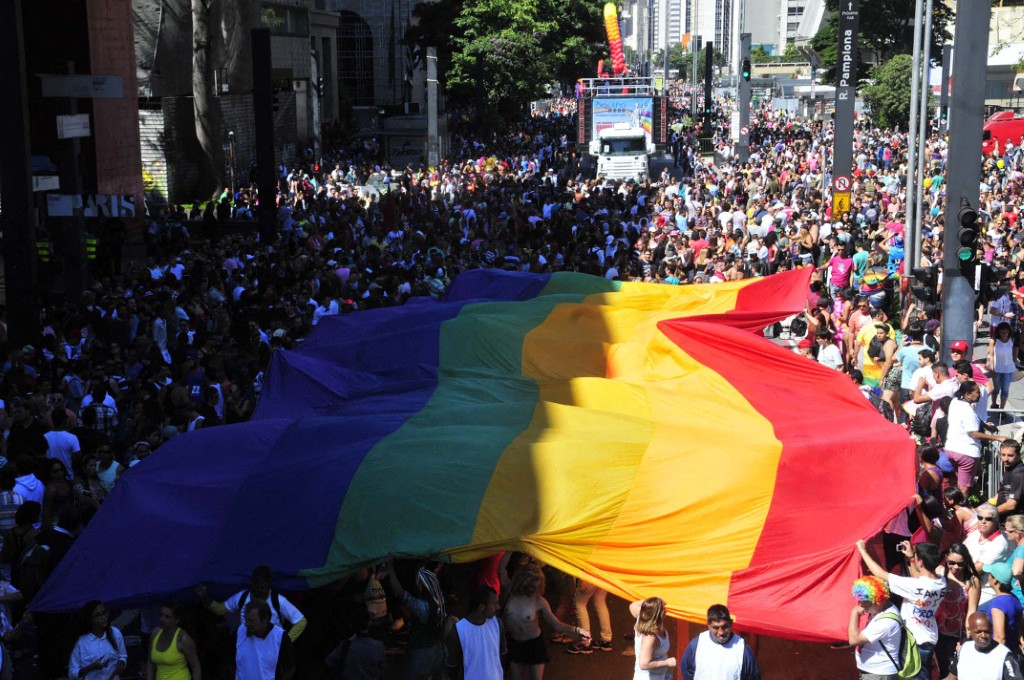International LGBTI+ Pride Day: celebration and fighting for rights
From the Pride Parade to progress in rights: check out legislative achievements and challenges for LGBTI+ Rights
 Parada do Orgulho LGBTQIA+ de São Paulo na Avenida Paulista, em 11 de junho de 2023, atrai milhões de pessoas para celebrar e desfilar. Foto: Cris Faga / NurPhoto / NurPhoto via AFP
Parada do Orgulho LGBTQIA+ de São Paulo na Avenida Paulista, em 11 de junho de 2023, atrai milhões de pessoas para celebrar e desfilar. Foto: Cris Faga / NurPhoto / NurPhoto via AFP
In different parts of the world, social groups fight for the achievement, expansion, and consolidation of human rights for LGBTI+ individuals. One way to advocate for these rights is by celebrating the existence of this population, which is honored on International LGBTI+ Pride Day, on 28 June.
In Brazil, the LGBTI+ movement began to gain momentum in the late 1970s with the formation of the group Somos in São Paulo (SP), which focused on discussing issues of sexuality and homosexuality. Later, the Grupo Gay da Bahia and the group Triângulo Rosa in Rio de Janeiro emerged, both dedicated to fighting for civil rights and public policies.
In 1992, the Association of Travestis and the Liberated (ASTRAL) was established in Rio de Janeiro, serving as a foundation for the creation of the National Association of Travestis and Transsexuals (ANTRA). ANTRA is dedicated to addressing the needs of the trans population and combating transphobia.
Read more
Since the return to democracy, the demands of the LGBTI+ movement have sparked intense political disputes in the Legislature. Although many debates have taken place in Congress, most of the achievements have been obtained through the Judiciary, especially via the Supreme Federal Court (STF). Brazil has legally recognized same-sex civil unions since 2011 and same-sex marriage was legalized in 2013. In 2019, the Supreme Federal Court criminalized homotransphobia, equating it with racism.
Another important factor for the advancement of LGBTI+ rights is representation in decision-making spaces, with the election of the first openly LGBTI+ candidates in the 2010s. In the 2022 election, a record number of 18 LGBTI+ representatives were elected to Congress and State Assemblies.
Setbacks
Despite progress made, there are still many challenges to be overcome. The most urgent is homotransphobic violence: in 2023, The Dossier of Deaths and Violence affecting LGBT+ People in Brazil reported that there were 230 deaths, of which 184 were murders.
Even though these problems are structural, recent years have seen a resurgence of proposals against the rights of this population. For example, the “Gay Cure” proposal returned to Congress, despite the issue being debunked by medical science in the 1990s. This proposal seeks to allow psychologists to offer treatment to “cure” homosexuality. Additionally, attempts to update family legislation, such as the “Family Statute,” have been used as reactionary agendas against LGBTI+ rights.
In 2019, the National Council to Combat LGBT+ Discrimination was abolished by the federal government, for example. The council was created in 2001 and was designed to formulate, propose, and monitor public policies against discrimination and in favor of LGBTI+ rights. Additionally, the Bolsonaro government did not allocate funds in the Federal Budget for specific actions aimed at the LGBT+ population.
Enough of negligence and regression in the legislature: the LGBTI+ Pride Parade in Brazil in 2024
With the change in government, some measures have been reversed, but the path remains a difficult one. The Ministry of Human Rights was reinstated and is now under the leadership of Minister Silvio Luiz de Almeida. The National Secretariat for the Promotion and Defense of LGBTQIA+ Rights was created within this ministry. It is led by Symmy Larrat, a journalist and former president of ABGLT (2017-2022). Additionally, the former National Council to Combat LGBT+ Discrimination was restructured as the National Council for the Rights of Lesbians, Gays, Bisexuals, Travestis, Transsexuals, Queers, Intersex and Asexual people and Others (CNLGBTQIA+).
In an interview with Conectas in 2023, Bruna Benevides, the secretary for the Political Articulation of the National Association of Travestis and Transsexuals (Antra) stated that The Lula government must demonstrate effective action to safeguard and guarantee the rights of the LGBTQIA+ community, particularly the trans and travesti population.
The challenges faced by LGBTQIA+ individuals are exacerbated by the rapid spread of discriminatory bills. On average, it takes less than a week for an anti-LGBTQIA+ bill to start being replicated in Brazilian legislative houses. These measures spread quickly, inciting moral panic and perpetuating discrimination.
An analysis by the LGBTQIA+ news agency, Diadorim, revealed that it takes, on average, only 5.75 days for an anti-LGBTQIA+ bill to be replicated and start to spread across Brazil, reaching municipal, state and national levels.
The arguments deployed by conservative deputies highlight the need to combat misinformation and prejudice. The fight against discriminatory bills, such as the prohibition of unisex bathrooms and the censorship of pro-LGBTQIA+ advertising, is fundamental in ensuring a safer and more inclusive environment.
As such, even after the return to progress by the government, addressing violence and securing rights for the LGBTI+ community at the legislative level continues to be a significant and ongoing challenge. This pattern of attacks and defense highlights the urgency of the struggle in this space, revealing the importance of events like the LGBT+ Pride Parade not only as celebrations but as essential platforms for resistance and claiming rights.
The 2024 LGBT+ Pride Parade held on 2 June 2024, in the city of São Paulo (SP) was a clear example of how these gatherings serve as platforms for both celebration and advocacy. This year’s theme, “Enough Negligence and Regression in the Legislature – Vote Consciously for LGBT+ Rights,” reaffirmed the community’s commitment to combating prejudice and supporting representatives who promote affirmative public policies. The theme emphasized advancing human rights agendas and combating negligence and regression in the legislative sphere.






